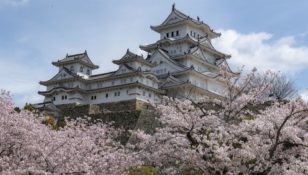Japan: The Land of Tradition, Technology, and Exceptional Beauty

Introduction:
In recent years, Japan has become an increasingly popular destination for travelers seeking a unique and enriching experience. From its rich cultural heritage to its cutting-edge technology, this captivating island nation offers a wealth of wonders waiting to be discovered. In this article, we will delve into the depths of Japan’s essence, exploring its history, traditions, and modern marvels. Whether you are planning a trip or simply fascinated by this captivating country, join us on a journey through the land of the rising sun.
I. Understanding Japan’s Cultural Essence:

1. Diversity and Harmony:
Japan is a nation that seamlessly blends tradition and modernity, creating a unique tapestry of cultural contrasts. It prides itself on maintaining a delicate balance between preserving its ancient customs and embracing technological innovation. From the tranquil beauty of its traditional tea ceremonies to the bustling neon-lit streets of Tokyo, Japan offers a myriad of experiences for those seeking both serenity and excitement.
2. Japan’s Spirituality:
At the core of Japanese culture lies a deep reverence for spirituality. Shintoism and Buddhism are the predominant religions, shaping the belief systems and customs of the Japanese people. Its temples, shrines, and gardens serve as tranquil sanctuaries where visitors can channel their spiritual energy and connect with the divine.
3. Etiquette and Politeness:
One cannot fully appreciate Japan without acknowledging its emphasis on etiquette and politeness. The Japanese adhere to a strict code of conduct, focusing on respect, humility, and thoughtful gestures. These societal norms elevate the overall experience of interacting with locals and contribute to the renowned reputation of Japanese hospitality.
4. Traditional Arts and Crafts:
Japan is renowned for its exquisite traditional arts and crafts, many of which have been passed down through generations. From intricate Kabuki theater performances to the delicate art of the tea ceremony, these artistic expressions offer a glimpse into Japan’s rich cultural heritage. By exploring these traditional art forms, travelers can gain a deeper appreciation for the mastery and precision that permeate Japanese craftsmanship.
II. Unraveling Japan’s Historical Tapestry:
1. Ancient Roots:
Japan’s history can be traced back thousands of years, with evidence of human habitation dating back to prehistoric times. From the Jomon period and the rise of agricultural communities to the Yayoi period, where rice cultivation and metalworking brought significant advancements, Japan’s early history laid the groundwork for its future development.
2. Feudal Japan and the Samurai:
Perhaps one of the most captivating eras in Japan’s history is the feudal period. During this time, powerful warlords and samurai ruled the land, creating a rigid hierarchical society. The samurai, with their strict code of honor and loyalty, have become iconic symbols of Japan’s feudal past. Exploring samurai castles, witnessing traditional martial arts demonstrations, and immersing oneself in the richness of their history offers a captivating glimpse into this bygone era.
3. The Meiji Restoration and Modernization:
In the late 19th century, Japan underwent a transformative period known as the Meiji Restoration. This marked the end of the samurai era and the beginning of Japan’s rapid modernization. The nation embraced Western influence and embarked on a journey of economic, political, and social reforms. From the construction of a formidable railway network to the adoption of Western-style education, this period laid the foundation for Japan’s emergence as a global powerhouse.
4. Post-World War II Rebirt
After the devastation of World War II, Japan rose from the ashes and reinvented itself. With determination and resilience, the nation rebuilt its cities and economy, propelling itself to become one of the world’s leading economic powers. Japan’s post-war revival is a testament to the unwavering spirit of its people and their commitment to progress.
III. Japan’s Magnetic Appeal on a Global Scale:
1. Technological Innovation:
Japan is renowned for its groundbreaking technological advancements. From the birth of manga and anime to pioneering inventions in robotics and artificial intelligence, Japan has consistently been at the forefront of innovation. By paying a visit to Tokyo’s Akihabara district or exploring the technological marvels of companies like Sony and Toyota, travelers can witness firsthand the nation’s dedication to pushing the boundaries of what is possible.
2. Picture-Perfect Landscapes:
Japan’s natural beauty is truly unparalleled. From the majestic Mount Fuji to the serene cherry blossom gardens, the country offers a visual feast for nature enthusiasts. The changing seasons bring forth a kaleidoscope of colors, creating an otherworldly atmosphere that captivates the imagination. Exploring Japan’s national parks, such as Hakone or Nikko, rewards visitors with breathtaking vistas and a deep sense of tranquility.
3. Gastronomic Delights:
Japanese cuisine, with its emphasis on fresh ingredients and meticulous preparation, has become a global sensation. From the delicate art of sushi-making to the sizzling teppanyaki grills, Japan offers a diverse range of culinary experiences for food enthusiasts. Sampling regional delicacies and immersing oneself in the vibrant culinary scene is an absolute must for any traveler looking to truly understand Japan’s gastronomic heritage.
Conclusion:
Japan’s allure lies in its ability to seamlessly blend rich history and age-old traditions with cutting-edge technology and modernity. This captivating country offers a wealth of wonders waiting to be explored, making it a dream destination for avid travelers seeking to immerse themselves in a culture as diverse as it is ancient. From the serene beauty of its temples to the pulsating energy of its cities, Japan continues to captivate and inspire all those who are fortunate enough to experience its magic firsthand.
References:
– Japan: The Official Guide. (2021). Retrieved from https://www.japan.travel/en/
– History of Japan. (2021). Retrieved from https://www.britannica.com/place/Japan/Historyref295700

















